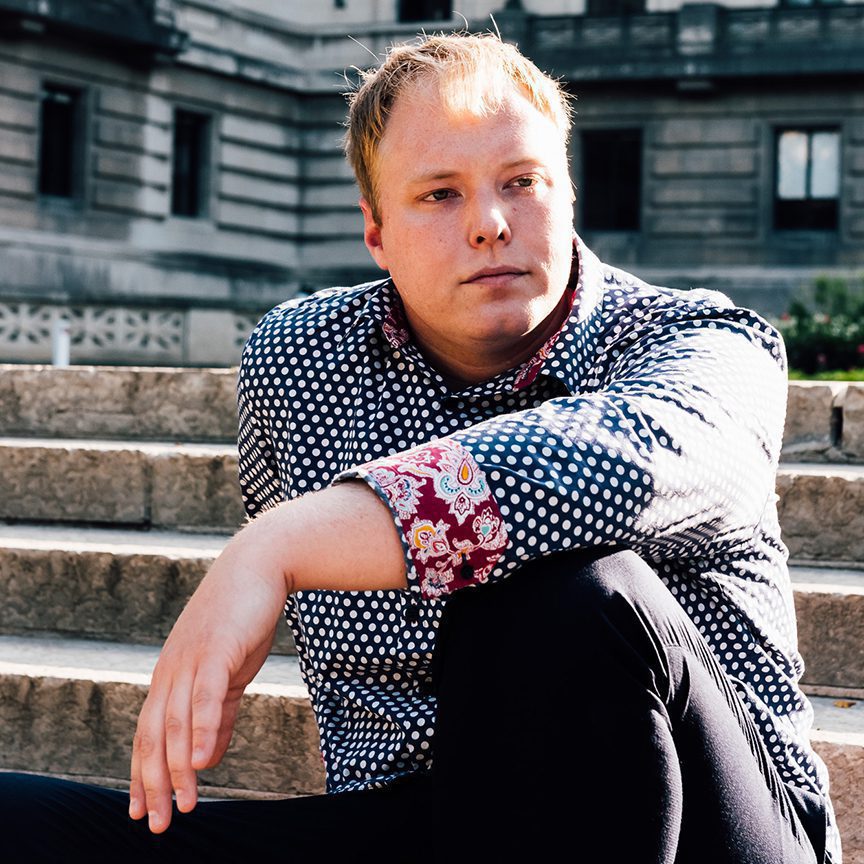Jazz Piano, Contemporary, Classical, Composition, Arranging and Digital Audio Workstation skills
Carter Graham’s blues-based style of playing, informed by his love of jazz, bebop, soul and pop music, is instantly the most recognizable aspect of his performances. The inspiration to pursue music as a career was born out of the joy of creation; early on in his studies he developed a strong desire to compose original music, and the medium of jazz limitlessly offers this outlet every time he touches the piano.
Carter maintains an active performing schedule, leading his own jazz trio as well as an original band, Vox Populi, which helped kicked off the 2017 Winnipeg International Jazz Festival at Old Market Square. He has performed with such jazz greats as Rodney Whitaker, Quincy Davis, Derrick Gardner, Randy Napoleon, Steve Davis and Jon Gordon. He most recently completed his Masters Degree while on a Graduate Assistantship, studying with pianist Xavier Davis.
His skills as a performer are not limited to jazz and this versatility has led him to work with blues bands, beat-boxers, rappers, rock, funk and soul artists, appearing in major festivals all over Canada and the USA.
Lately Carter has been diving into teaching virtually, an incredible way to connect and share the gift of music without any physical barriers. He would love the opportunity to work with students who are curious about composition and arranging. Through composition, he sees the potential that content creation platforms have in terms of motivating students to continue to grow and achieve goals. As a teacher, Carter prefers to tailor lessons to suit the needs and goals of the student.
After a life-changing stay in New York City, Carter has returned to Winnipeg, ready to commit to community musical outreach and prepare for his debut recording as a leader. He continues to hone his craft on the piano while seeking to carve out a distinct artistic voice as a performer and composer.
What is your education and experience?
B. Jazz, University of Manitoba; M. Music, Michigan State University
Tell us about one of your fondest musical memories.
Anytime I get to make music with others is a blessing and I live for those moments. I have many favourites, but one of them was getting called up on stage unexpectedly to sit in with the vocalist Dee Dee Bridgewater, Terri Lynne Carrington and Rodney Whitaker. It was on my first ever gig in the U.S., as part of a tribute for the late great pianist Geri Allen in Detroit. I was so nervous! But it went well and to be able to experience that level of musicianship was an incredible experience I’ll never forget.
What made you decide to study music?
I always had a sort of obsession with listening to music growing up, putting on my parents’ vinyl records and sitting and learning every Beatles album (among others) they had. In terms of deciding to study music, that occurred years later when I went to the Brandon Jazz Festival in grade 7 and saw/heard live jazz for the first time. I was immediately hooked and knew from that moment I wanted to explore that music and learn how to improvise.
How are your lessons unique?
This may sound cliché, but everybody really is unique. It doesn’t make sense for me to rigidly enforce my ‘one’ lesson plan on every student who walks through the door. When I was at MCMA before, my students ages ranged from 6 to 60+, and each student was there for a different reason. There are certain core fundamentals we all need to learn in order to develop and grow on our instruments, but at the end of the day, I want the student to be happy to be there, engaged and excited to go home and work on what we discovered in a lesson, whether that be a new chord progression, a new song, a challenging scale, or whatever they happen to be studying.
What’s your favourite part about teaching?
One of my favourite things about teaching is getting to experience a ‘Eureka’ moment with a student. Watching the look of excitement as they play a piece through to the end for the first time or a concept finally makes sense to them, that’s what makes teaching fun.
What would you say to someone who is interested in studying music?
Listen! It seems obvious, but it can be easy to get caught up in the paper or theoretical concepts. But at the end of the day, no matter what we specialize in in music, we need to train our ears to listen and understand what it is we are hearing. And then learn what you hear.

